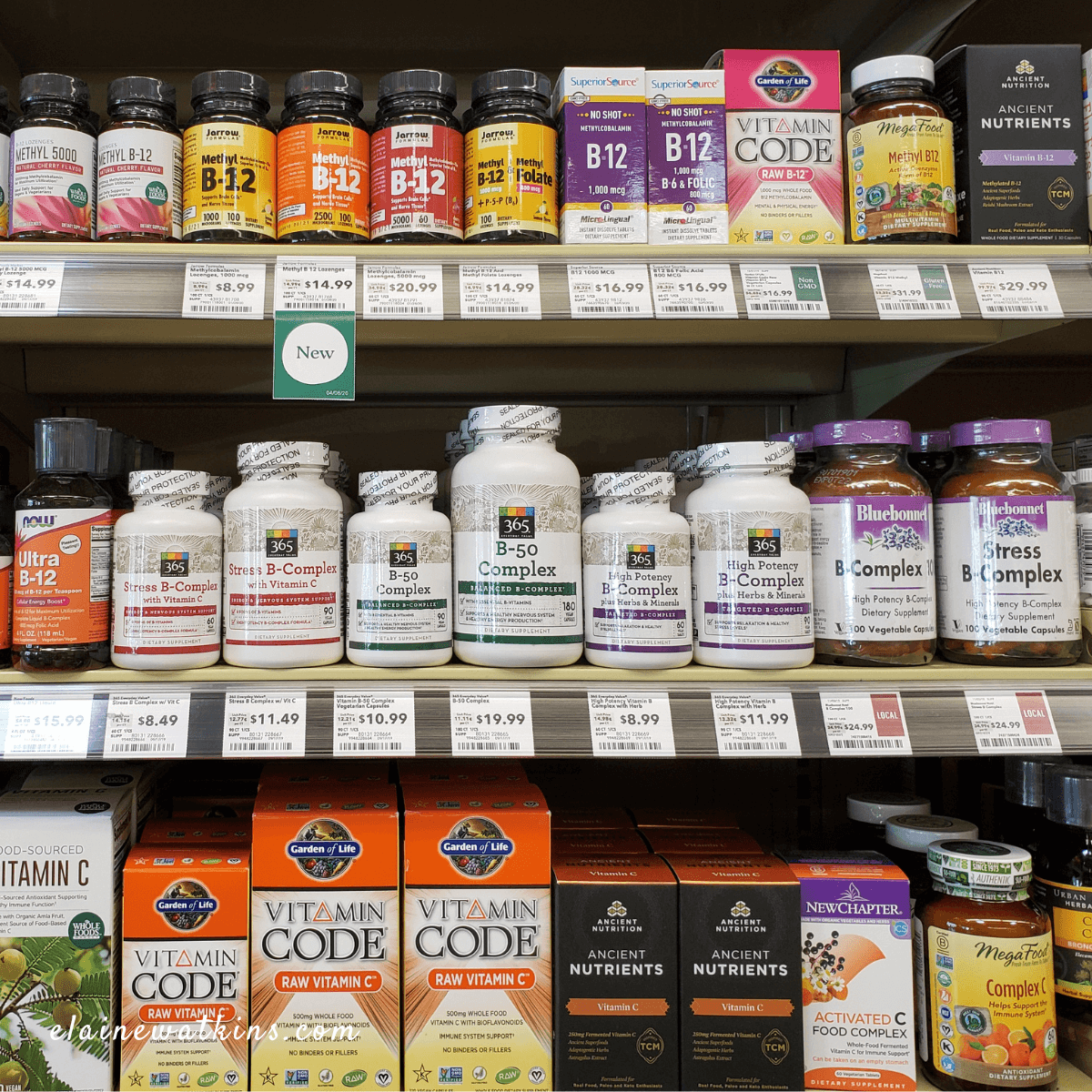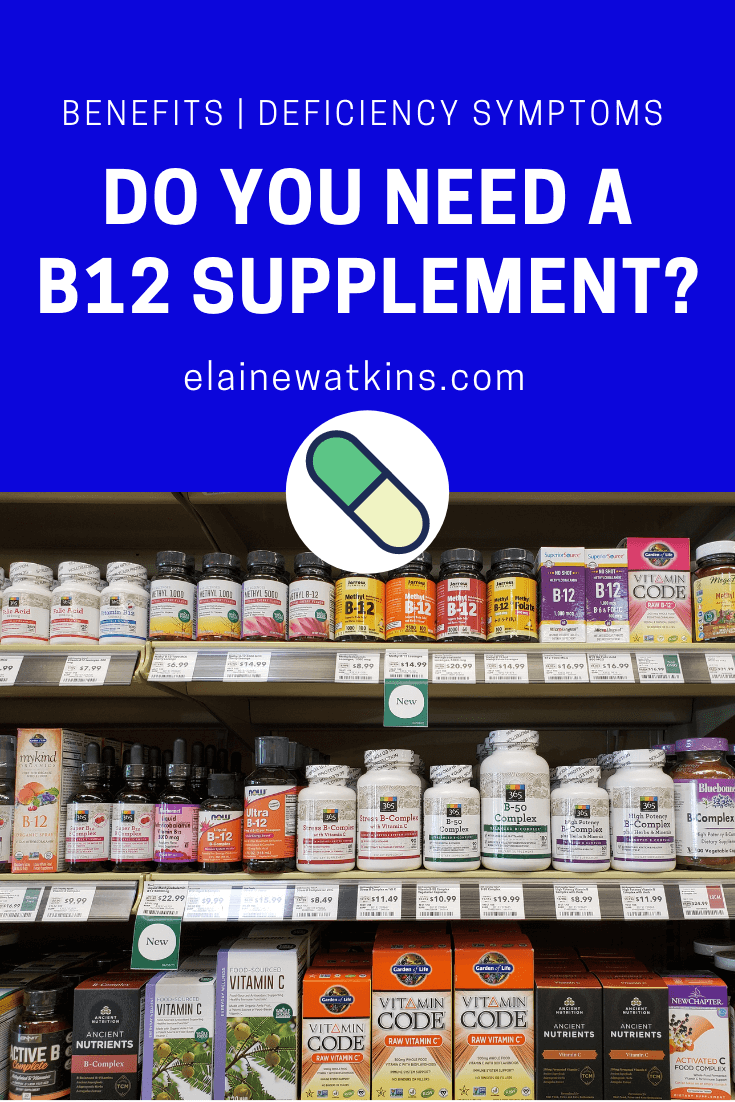Do You Need a B12 Supplement?

Vitamin B12, also called cobalamin, isn’t the easiest vitamin to get through your food, but you definitely don’t want to be deficient. So do you need a B12 supplement?
Maybe!
I can tell you it was consistently low on my labs for years and was part of the struggle I experienced for a long, long time.
Maybe longer than I realize.
So here’s a brief introduction to B12 for your information.
What is B12?
If you check the label of your multi-vitamin, you’ll probably see B12 included in the vitamin and mineral list. Of course you’ll also see it included in any B Complex you might be taking, choose a standalone B12 supplement or combined with B9 (Folate).
Also called cobalamin, because it includes cobalt at it’s center, it’s a complex vitamin that comes from bacteria in healthy soil.
We all need B12, and our options for getting it are to:
- take a supplement
- eat plants that haven’t been totally sanitized and still include the bacteria
- eat an animal product from an animal with a healthy digestive tract that has freely grazed and eaten plants with the bacteria on them
- choose animal products from an animal that has been given a supplement
- eat foods where B12 has been added (fortified)
What Is B12 Good For?
Our bodies are beautifully complex creations, so let me be sure to state that B12 does not work alone in any of the many processes it participates in including:
- energy production
- nerve building and protection
- DNA and RNA production and function
- healthy blood cell formulation
- protein metabolism
- brain function and mental health
- heart and vascular health
So B12 is part of just about everything you do.
But what if you don’t have enough?
B12 Deficiency and Excess
I was low in B12 when I was eating a standard American diet (SAD) and continued to be low even as I started eliminating processed foods, cleaning up my meat choices, and increasing my fruits and vegetables when I was diagnosed with hypothyroidism. leaky gut
There’s actually a lot that can go wrong along the path that B12 travels before absorption and use. It hitches quite a few rides with different proteins, starting in your mouth, before eventually hooking up with the hormone called intrinsic factor to be absorbed in your small intestine.
If there’s a problem with any of the necessary proteins, if you don’t have enough stomach acid or have weakened stomach acid, if you don’t produce enough intrinsic factor, or some other potential challenge, you might have a problem absorbing and accessing enough active B12 to feel good, have energy, think clearly, and more.
Additionally, gastric surgeries and medications (over-the-counter and prescribed), including proton pump inhibitors and Metformin to name a few, can impact absorption.
And another challenge relates to your genes and a combination of SNPs (single nucleotide polymorphisms) that can be turned on or off and potentially hinder your ability to activate and utilize the B12.
All in all, supporting your health, and digestive health in particular, is key to B12 absorption, and so much more.
Symptoms
You can have an overabundance of B12, but it’s not really common and symptoms can be similar to that of a B12 deficiency. Common symptoms telling you there’s a problem that might relate to B12 include:
- numbness, loss of concentration, disorientation
- tingling in your arms, hands, and face
- vision problems
- pale skin
- burning sensations
- bleeding gums
- macrocytic anemia
- irritability
- shortness of breath
- low energy, fatigue and weakness
- memory loss, nervousness, and depression
- megaloblastic anemia
Something else that’s interesting is that you can actually appear to have an adequate B12, but actually be low, so homocysteine and Methymalonic Acid (MMA) numbers that are included in some labs can signal a need to explore further.
What Foods Contain B12
Vitamin B12 actually exists as a soil-based bacteria, but plants don’t absorb B12. Considering the level of sanitizing that most foods go through before reaching your plate, you are probably not getting it naturally on your fruits and vegetables.
Even though animals cannot produce B12, they can usually store B12 picked up from the soil and waterways. Animal foods that typically rank with a higher level of B12, a higher Daily Value rating, and a higher nutrient-density include:
- Sardines
- Salmon
- Tuna
- Cod
- Lamb
- Scallops
- Shrimp
Beef ranks further down the scale, but unfortunately, all of these are also inflammatory foods.
Foods that are fortified with B12 include most plant milks, nutritional yeast, and some grain products.
But I was low in B12, even though I regularly ate foods reportedly high in the nutrient, and commonly recommended, so where was the disconnect?
Absorption
If you’re like me, you might have challenges with absorption and need to consider other strategies for access to B12. At that time, I regularly ate inflammatory foods that caused quite a few problems with digestion and nutrient absorption. Over time, I became more and more deficient.
I also eventually learned I have a methylation problem, tied to those gene SNPs I mentioned earlier. Methylation is one of the many important pieces that make up a healthy functioning body. For me and many others, methylation is limited, and therefore, the use the B12 and others, are not functioning to full capacity.
This was all coming together as a big wake up call for me. It teetered on overwhelming, but I knew I needed to figure out at least enough to change my trajectory.
Evaluating B12 Accessibility
There are several different forms of B12, but the four you might more commonly see or be familiar with are:
- cyanocobalamin – used in many supplements and fortified foods; cheap but not necessarily the best choice-contains cyanide
- methylcobalamin – active form reported to be a good option and commonly recommended for those with methylation challenges
- adenosylcobalamin – another active form reported to be a good option recommended to assist mitochondrial function
- hydroxycobalamin – usually used in B12 injections
I knew I had a methylation challenge, but in my research I also realized I could supplement smartly with already methylated options that would skip over the step where I was limited.
Aside from any methylation challenges, probably even more common challenges to B12 access include:
- eating an unhealthy, inflammatory diet
- having a low stomach acid level or weakened stomach acid
- having compromised stomach, pancreas, or intestinal function
- frequently experiencing unhealthy levels of stress
- having surgery or some type of alteration that can hinder digestion, production, and/or absorption
With a relatively healthy gut function, however, transport and eventual absorption of B12 can be much more effective to play it’s part in methylation, energy production, and other functions of your body.
I hadn’t had any type of surgery relating to my digestive functions, but every other area needed work.
So I:
- changed my diet and significantly reduced the level of inflammatory foods that caused me problems
- greatly increased my intake of anti-inflammatory foods that were/are nutrient dense and healing
- began (and continue) work to prioritize stress management strategies
- added a quality B12 supplement to my regular routine
B12 Supplement Options
If you decide to explore B12 supplements, there are several options too choose from including:
- Injection – either given during regular practitioner appointments or with a prescription and then personally done
- Sublingual drops, lozenges, or gum – generally held under your tongue for about 30 seconds
- Liposomal – developed for easier absorption
- Capsules, tablets, softgels, and even gummies
- Topical patches, creams – but can have folic acid instead of folate
As with pretty much anything that goes in or on you, definitely read the label, know what ingredients are included in the B12 supplements you are considering, and make an educated decision.
Do You Need a B12 Supplement?
If you suspect you have a B12 deficiency, talk with your functional medicine practitioner.
And if you like this type of information, be sure to subscribe.
Also be sure to head over to these articles for more helpful information:
- Stress: Causes, Effects and Stress Management Strategies
- How using A Daily Tracker Can Give You Helpful Information


